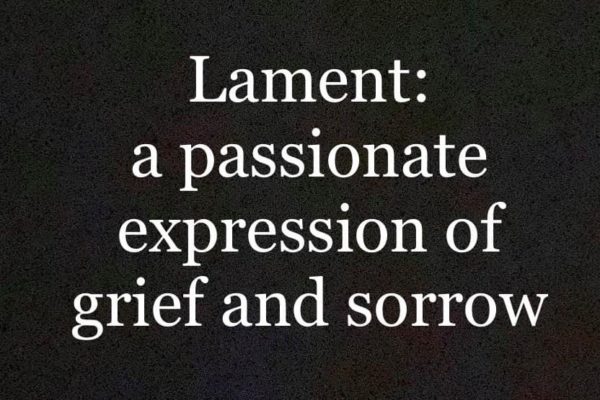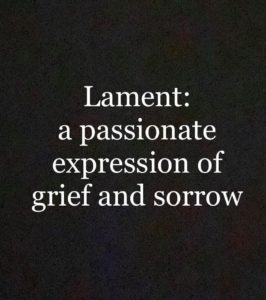Friday Devotion with Kim Wu
In the 21st chapter of 2 Samuel, we find Rizpah, one of Saul’s concubines, lamenting the death of her two sons. Verse 10: “Rizpah daughter of Aiah took sackcloth and spread it out for herself on a rock. From the beginning of the harvest till the rain poured down from the heavens on the bodies, she did not let the birds of the air touch them by day or the wild animals by night.” This act of love and courage, and lament and grief for Rizpah, lasted for six months, as she quietly protected the bodies of her sons.
In the 11th chapter of Judges, Jephthah has vowed to the Lord that he will sacrifice as a burnt offering the next person who comes through his door, in exchange for victory against the Ammonites. When his daughter came dancing out the door, he tore his clothes and cried, “Oh! My daughter! You have made me miserable and wretched.” His daughter, upon hearing of her fate, says “Give me two months to roam the hills and weep with my friends, because I will never marry.” The Bible also tells us that each year after her death, the young women of Israel would go out for four days to commemorate her.
Our third scripture to examine is found in Acts 9:36-42. Peter is summoned to a room where lies the body of Dor’cas, a disciple who became sick and died. “All the widows stood around him, crying and showing him the robes and other clothing that Dor’cas had made while she was still with them.”
From these scriptures, we come to understand that lament can be quiet or loud, solitary or communal, be sustained over long periods of time, and move us to action. Biblical lament plays a role in helping us seek justice and peace today. As it brings voice to pain and anguish, lament challenges our long-held understandings of those situations which have caused such suffering, allowing us to see and name injustice. In protests across this country and in prayers offered, we hear and see lament in its various forms: the loud cries of grief, the reading of the names of those whose lives were tragically lost as a result of racism, the pounding of feet as people walk together in solidarity, the posture of bending down onto one knee.
Let us continue to make space for these different voices of lament, recognizing them as acts of truth-telling and expressions of hope in Jesus. Allow them to move us to a deeper understanding of each other and our call to seek justice and encourage the oppressed.
Thursday Devotion with Pastor Will and Pastor Ellen
Monday Devotion with Kitty Stapleton
“The word of the Lord came to me: Hanamel son of Shallum your uncle is going to come to you and say, ‘Buy my field at Anathoth.’ so I bought the field at Anathoth from my cousin Hanamel.” - Jeremiah 32:7 & 9
Buying a field from a cousin doesn’t seem like an unusual thing until you learn the context of the story. Jerusalem was under siege and Jeremiah was imprisoned by Zedekiah king of Judah because he didn’t like Jeremiah’s prophecy: “This is what the Lord says: ‘I am about to give this city into the hands of the king of Babylon, and he will capture it.4 Zedekiah, king of Judah, will not escape the Babylonians.’” (Jeremiah 32:3b-4a) Now, we can understand why Zedekiah was unhappy with Jeremiah!
Now, our question becomes, “why would God tell Jeremiah to buy a field when God, Himself, has told Jeremiah that Jerusalem is about to be captured?” What does this this message mean for us? In researching these verses, I found that many people find the message to be one of judgment or one of hope. Are we being judged because we have not followed God’s command to:“Love the Lord your God with all your heart and with all your soul and with all your mind and with all your strength”?(Mark 12:30).
However, I don’t feel that God is judging us. For me, the main message is one of Hope. Times are difficult now but we can look forward to a time when the Coronavirus will pass or be conquered. Why do I have this hope? 6 “‘Nevertheless, I will bring health and healing to it; I will heal my people and will let them enjoy abundant peace and security.” (Jeremiah 33:6).
I’m hoping that we use this time of “imprisonment” to deepen our spiritual life. Many people are not working or they are working from home. Even those who are working outside the home have fewer demands on their time—no children’s extracurricular activities, no meetings to go to or their meetings are on zoom so less time is spent rushing to get to them on time. Even church services, classes, and Bible studies are online. All of these means of communication give us more free time.
There are many opportunities for us to grow in our faith. We can take advantage of the streaming and/or online activities; spend more time in prayer or Bible study; reach out to others—call, skype, send cards or notes, etc.
“Nevertheless, I will bring health and healing to it; I will heal my people and will let them enjoy abundant peace and security.” (Jeremiah33:6)



